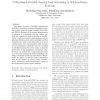Free Online Productivity Tools
i2Speak
i2Symbol
i2OCR
iTex2Img
iWeb2Print
iWeb2Shot
i2Type
iPdf2Split
iPdf2Merge
i2Bopomofo
i2Arabic
i2Style
i2Image
i2PDF
iLatex2Rtf
Sci2ools
131
click to vote
ICWN
2007
2007
Utility-Based Divisible Sensing Task Scheduling in Wireless Sensor Networks
This paper presents a tractable optimization strategies of sensing workload scheduling in wireless sensor networks using Divisible Load Theory (DLT). Because of the limited battery power of sensors, it is desirable that the sensor network can complete a task as quickly as possible. Given a task, each source node processes an appropriate fraction of the entire workload and then transmits the result to the sink node via a set of routing nodes. Two representative network models are presented to illustrate how the workload is scheduled among the sensor nodes so that the finish time of the workload is minimized. Furthermore, we present the energy model for nodes in a two-level hierarchical network topology. Finally, simulation results are presented to demonstrate the effects of selected system parameters such as the number of sensor nodes, measurement, processing, and communication speed on the performance of the sensor network.
Related Content
| Added | 29 Oct 2010 |
| Updated | 29 Oct 2010 |
| Type | Conference |
| Year | 2007 |
| Where | ICWN |
| Authors | Xiaolin Li, Xinxin Liu, Peng Guan, Hui Kang |
Comments (0)

